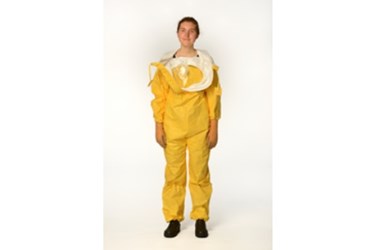Johns Hopkins And DuPont Join Forces To Produce An Improved Ebola Protection Suit

The collaboration began in response to the humanitarian need identified by the U.S. Agency for International Development (USAID) during the recent Ebola outbreak in West Africa.
BALTIMORE, MD. (PRWEB) - The Johns Hopkins University and DuPont have signed license and collaboration agreements allowing DuPont to commercialize a garment with innovative features from Johns Hopkins to help protect people on the front lines of the Ebola crisis and future deadly infectious disease outbreaks. DuPont intends to have the first of these garments available in the marketplace during the first half of 2016.
The collaboration between the major research university and the international science and engineering company began in response to the humanitarian need identified by the U.S. Agency for International Development (USAID) during the recent Ebola outbreak in West Africa. In this region, the Ebola virus has infected more than 28,000 patients and resulted in more than 11,000 deaths. Harsh climates and ill-equipped health systems have led to tough working conditions that made it particularly difficult to keep the infections at bay. As the disease spread, many nurses, doctors and others were fatally infected by the patients they were treating. The World Health Organization has confirmed more than 800 Ebola cases among health workers in Guinea, Liberia and Sierra Leone, leading to more than 500 related deaths.
As this grim toll came to light, public health experts, scientists and biomedical engineers in the public and private sectors were called on to help. In December, the USAID selected the new Johns Hopkins prototype protective garment, made of a DuPont advanced material, as one of the first five projects to receive funding to address the healthcare challenge posed by Ebola.
The prototype garment was developed by the Johns Hopkins Center for Bioengineering Innovation and Design (CBID), with input from global health partner, Jhpiego, a Johns Hopkins affiliate. Incorporating some elements from the Johns Hopkins prototype, the garment design from DuPont will feature a rear zipper and a “cocoon-style” removal, or doffing, process that requires far fewer steps to reduce risk. The DuPont garment may include an integrated hood with a large clear visor.
The collaboration with DuPont, a global leader in personal protective apparel, will expedite wide market access for the garment. For more than 40 years, the company has been providing such apparel to help protect the safety of industrial and healthcare workers. Under the agreements, Johns Hopkins will assist DuPont in evaluating prototype garments produced by DuPont and will aid in the preparation of information for users. DuPont will be responsible for all aspects of commercialization. Further terms of the agreements were not disclosed.
“This unique collaboration,” said Youseph Yazdi, executive director of CBID, “brings together the biomedical ingenuity of Johns Hopkins, the global healthcare experience of Jhpiego and the strategic industrial innovations of DuPont to help save lives worldwide. Although this project was triggered by the recent Ebola outbreak, we believe the improved protective suit’s design will be impactful in future infectious disease outbreaks as well.”
Marc Doyle, senior vice president DuPont Safety & Protection, added, “Our participation in the USAID Grand Challenge and subsequent collaboration with Johns Hopkins and Jhpiego is an example of how DuPont engages with partners to address a global challenge. We look forward to the next step of making this protective apparel solution available where it is needed for both emergency response and preparedness.”
Jhpiego will field-test the DuPont prototype garment in Liberia, one of the three African countries hit hardest by the recent Ebola outbreak. Liberia is a nation where Jhpiego has deep roots and experience in health systems strengthening and training of health workers.
Leslie Mancuso, president and CEO of Jhpiego, said the new garment will help ensure that frontline health workers can respond safely and with confidence to any new infectious disease outbreak. “Hundreds of nurses, midwives and physicians selflessly responded to the Ebola outbreak and lost their lives trying to save others,” said Mancuso. “The response of Johns Hopkins, Jhpiego and DuPont to the humanitarian challenge offers a model of the ingenuity and dedication of the public and private sector to improve global health.”
For more than 40 years and in over 155 countries, Jhpiego, a nonprofit global health affiliate of Johns Hopkins University, has worked with health experts, governments and community leaders across Africa, Asia and Latin America to develop unique partnerships and strategies that prevent the needless deaths of women and their families. A globally recognized technical leader in maternal, newborn and reproductive health, Jhpiego helps countries care for themselves by training competent health care workers, strengthening health systems and improving delivery of quality care, from home to hospital, village to city. For more information, visit http://www.jhpiego.org.
The Johns Hopkins Center for Bioengineering Innovation and Design operates within the university’s top-ranked Department of Biomedical Engineering. This department is shared by the university's School of Medicine and its Whiting School of Engineering. CBID has a dual mission of education and innovation, developing talented leaders in medtech design and commercialization as well as high impact healthcare solutions. In addition to major support from USAID’s Ebola Grand Challenges program, additional support for this project was provided to CBID by the GE Foundation; Clinvue, a medical device innovation consulting company; and the BioMaryland Center, an office within Maryland's Department of Business and Economic Development; and faculty and students from across Johns Hopkins University. Additional information can be found at http://CBID.bme.jhu.edu.
Color images of the improved Ebola protection suit prototype can by obtained by contacting Phil Sneiderman.
Johns Hopkins University news releases are available online, as is information for reporters. To arrange a video or audio interview with a Johns Hopkins expert, contact a media representative listed above or send an email message to Len Turner at ltu(at)jhu(dot)edu. Find more Johns Hopkins stories on the Hub.
Source: PRWeb
View original release here: http://www.prweb.com/releases/dupont-protection-tech/johns-hopkins-ebola-suit/prweb12988710.htm
